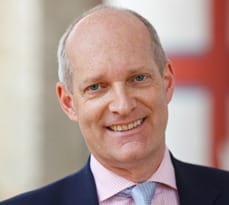Dr Simon Taylor of Cambridge Judge Business School reflects on the lack of sufficient reform in finance since the School’s Master of Finance (MFin) degree programme launched in the wake of the financial crisis.

Simon Taylor, Faculty (Professor level) in Management Practice (Finance) at Cambridge Judge Business School, just stepped down after 10 years as Director of the School’s Master of Finance programme, and will now focus more time on teaching and research. He shares his thoughts about the programme’s launch in the wake of the financial crisis, and how finance reform still has a long way to go.
When I was asked to create the new post-experience MFin degree, I viewed it a bit like setting up a new business: define the product, find a market for that product, decide how to deliver it, create a marketing plan, and hope that people apply.
As part of those preparations, I consulted widely including with former clients and colleagues in the finance industry, and one key message came back: include some non-finance teaching. They were all a bit fed up with employing technically bright graduates in finance who lacked any other knowledge about the world or how to get on with other people.
So this led to inclusion in the MFin of a shorter version of the Business School’s MBA Management Practice series, plus a stream of lectures by non-finance academics – who were asked to teach what they thought finance students should know about strategy, organisational behaviour, entrepreneurship and other important topics.
The other key ingredient, in my view, was to have practitioners teaching or at least presenting to students all through the year. Thus was born the City Speaker Series, where a speaker would talk for an hour or so then would go with 10 or 12 students to have dinner in a small, usually wood-panelled and candlelit room in a College. Such intimacy provides a wonderful opportunity to get to know the speakers and hear what they really think about the business, their careers and life in general.
The first class was 23 students. As the 11th year just got underway this autumn, the programme has grown to 83 students – and a lot has changed in the past decade. The first class sat down in Lecture Theatre 2 just two weeks after the Lehman bankruptcy, so it was a scary time for anybody in finance and for the wider economy. It wasn’t until early 2009 that it became reasonably clear that the whole system would survive, thanks to bold action by the US Federal Reserve and the British government.
But not enough has changed since then. Like most financial economists I believe the banks should be far less leveraged (they should have more equity capital to withstand the losses they will inevitably make, without needing help from the government). Regulatory equity requirements are far higher than before the crisis but they were absurdly low then and are still too low now. A lot of the new regulation is hopelessly complex and it would be better to have more financially robust banks that could then be left more free to do what they want in the wholesale markets (retail customers need to be protected from the tendency to mis-sell that seems endemic in this industry).
I’m also not sure there has been much evolution in the ideas of finance. The great majority of finance theory is applied microeconomics and has not changed much in 10 years. Most teachers are a little more sceptical about the efficiency of markets than they were before the crisis but the basic idea remains, I think correctly, that it is wise to assume that you cannot easily beat the market. But the related idea that the market price is always right, a different aspect of the efficient markets hypothesis, has taken a beating. Unfortunately, I think some people’s high hopes for the impact of behavioural finance have not been met. Perhaps the explosion in neuroscience research will provide a profound new insight into the key question of finance: how do people behave in an uncertain world?
The more important area (and for me the most interesting) is in the interaction of finance theory with macroeconomics.
Before the crisis, mainstream macro largely ignored the financial system – believing that money and markets are largely irrelevant to the “real” economy. Central banks were (and largely still are) full of macroeconomists with very little knowledge of the financial system or markets. It takes a financial crisis to remind people of how finance can be the tail that wags the macroeconomic dog – in particular, that debt matters enormously (as we learned in the great Japanese bubble and crash) and should have been an area of key concern before the US crisis. There is now a lot of academic work that incorporates financial “frictions” and debt into otherwise standard optimising macro models. I hope it’s sufficient, but I’m not sure there has been enough of a revolution to provide the ideas needed to prepare for the next crisis – which will inevitably arrive at some point, and in a different form from the last one.
This article is an abridged version of a post in Simon Taylor’s blog, Behind Blue Eyes.


